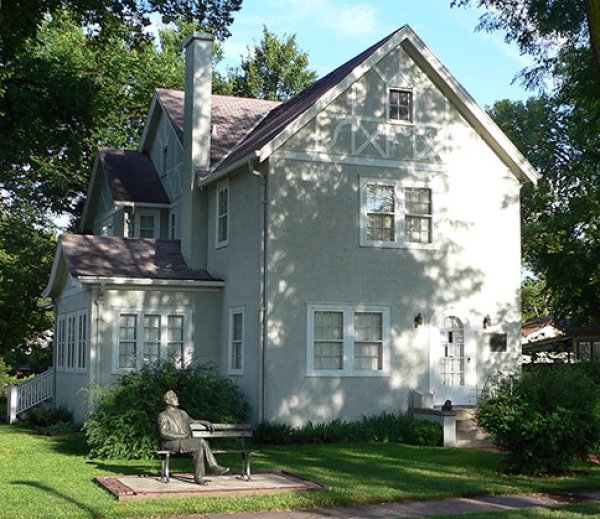George W. Norris was born in 1861 in York Township, Sandusky County, Ohio. When he was only three years old, both his older brother and his father died leaving his mother, Mary Magdalene Norris, to raise and provide for George and his six sisters. At the time, Mary Norris was forty-six years old and pregnant for the twelfth time. The Norris family farmed and lived in near poverty.
Mrs. Norris instilled in young George a strong religious faith, a respect for education, and a fierce sense of right and wrong. These qualities would return to help George Norris time and again throughout his career in government.
Norris graduated from law school at the Northern Indiana Normal School in 1883. To help finance his college education he taught school off and on for several years. Norris headed west in 1885, making a short and unforgettable trip to Washington state before deciding to settle in Nebraska. Norris had relatives in Nebraska and his mother held the deed to an eighty-acre farm in Johnson County, near Tecumseh, Nebraska. After a short time in southeast Nebraska, Norris moved again; this time to Beaver City, Nebraska, in the Republican River valley.
In 1899, he moved his family to McCook, Nebraska. As the judge there, he witnessed the impact of farm foreclosures on families and made a way to postpone these foreclosures by taking into consideration the harsh weather of those years.
Norris was elected to the U.S. House of Representatives in 1902, serving for five terms (ten years). He was then elected to the U.S. Senate in 1912, where he also served five terms until 1942 (thirty years). Senator Norris’s accomplishments during the years when he represented Nebraska in Washington, D.C. included writing the Twentieth Amendment to the U.S. Constitution, which is also known as the “Lame Duck” amendment. A “lame duck” is a politician who is about to leave office. The amendment shortened the amount of time between the November election and when newly elected politicians took office. It called for the newly elected Congress to begin their work on the first Monday in January and the new President to be inaugurated about two weeks later, which is still done today.
Senator Norris is credited with planning the Tennessee Valley Authority (TVA), which provided flood control and created electricity in the region drained by the Tennessee River. The TVA provided a series of dams, which brought flood control as well as water to farmers during drought and electricity to those who could not otherwise afford it, especially in rural areas (The Rural Electric Administration or REA). Norris believed that the federal government should control natural resources so the greatest number of U.S. citizens could benefit from those resources. Norris fought to preserve and complete the work of the TVA to put this belief into action.
Senator Norris wrote and promoted the amendment to the Nebraska Constitution that created the Unicameral Legislature in Nebraska, the only such body among the fifty states. The Unicameral is has only one deliberating body, the Senate. Nebraska has no House of Representatives. He promoted the Unicameral by visiting every section of the state. The Unicameral was approved by voters in 1934 and started in 1937.
Norris’s home in McCook is listed in the National Register of Historic Places. It is now operated as a museum by the Nebraska State Historical Society.


